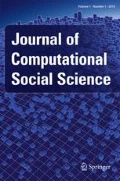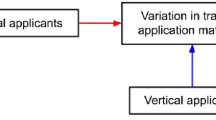Abstract
Study abroad and the associated sociocultural experience has been a subject of substantial interest to social science scholars and university administrators. Shedding novel light on the phenomenon, we draw on a corpus of student-authored reflective essays and apply machine learning methods for analysis of text-as-data to examine the features and the determinants of salient themes emphasized by students in their study abroad reflections. Our analysis identifies 18 different topics spanning the domains of distinctly cultural cognition, interaction with people, physical environment, and personal change. Specifics of the experience such as duration and location, timing of reflections, and observable student characteristics including gender, major, academic performance, extracurricular involvement, and socioeconomic status are all important determinants of student’s reflections. Different factors, however, matter differently with respect to students’ emphases on particular topics, a finding indicative of the complex nature of the study abroad experience.




















Similar content being viewed by others
Notes
A Scopus search on 'study abroad' appearing in the title, abstract, or keywords identifies more than 2000 published contributions, with the vast majority of publications dated after year 2008. An analogous search using Google Scholar reveals many more works. For a necessarily limited set of sample contributions and further references, see, e.g., Carlson and Widaman [6], Ryan and Twibell [33], Dwyer [9], Rundstrom Williams [32], Hadis [15], Anderson et al. [2], Paige et al. [26], Collentine [7], Norris and Gillespie [25], Basow and Gaugler [3], and Terzuolo [37].
For example, the words 'dog' and 'bark' will appear more often in a topic about dogs, 'cat' and 'purr' in a topic about cats, while 'pet' and 'vet' may appear roughly equally in both. Documents feature multiple topics in different proportions. A document that is 20% about cats and 80% about dogs will tend to feature four times as many dog words as cat words.
See https://www.structuraltopicmodel.com for an updated list of published applications of STM.
For an exposition of the formal statistical structure of the STM and computational aspects of estimation, see Roberts et al. [28].
This figure does not include shorter spells abroad as part of regular coursework offered by resident faculty.
We dropped four essays of students who by the time of completion of our data collection had not yet turned in both the early and the ex-post reflection essay in the required format.
In studying the words lists, it is important to keep in mind that STM-based estimates of topics are driven by correlations across documents in the occurrence of words. Thus, estimated word lists will also contain words that are on their own not particularly informative about the core ideas underlying a topic. (For example, 'can' and 'will' are among highest probability words for several topics.) Indeed, this is an aspect of STM that human readers cannot easily match. An author's use of a topic might rely on specific combinations of words in patterns that a human reader might find hard to discern.
Roberts et al. [30: 12] note that to implement the regressions, "…the topic model should contain at least all the covariates contained in the estimateEffect regression". Accordingly, the set of metadata variables that we utilize to estimate the effect of specific metadata covariates on topical prevalence conceptually coincides with the set of metadata covariates that we utilize to estimate the topics. Practically, to estimate the effects associated with categorical and numeric variables that take on multiple values (such as, e.g., Region and GPA; see Table 2), we define and utilize in the analysis corresponding binary variables that highlight the effects of interest (e.g., Africa vs. other regions; above median GPA vs. below median GPA).
References
Anderson, P. H., & Lawton, L. (2011). Intercultural development: study abroad vs. on-campus study. Frontiers: The Interdisciplinary Journal of Study Abroad, 21, 86–108.
Anderson, P. H., Lawton, L., Rexeisen, R. J., & Hubbard, A. C. (2006). Short term study abroad and intercultural sensitivity: A pilot study. International Journal of Intercultural Relations, 30, 457–469.
Basow, S. A., & Gaugler, T. (2017). Predicting adjustment of U.S. college students studying abroad: Beyond the multicultural personality. International Journal of Intercultural Relations, 56, 39–51.
Blei, D. M. (2012). Probabilistic topic models. Communications of the ACM, 55(4), 77–84.
Blei, D. M., Ng, A. Y., & Jordan, M. I. (2003). Latent Dirichlet allocation. Journal of Machine Learning Research, 3, 993–1022.
Carlson, J. S., & Widaman, K. F. (1988). The effects of study abroad during college on attitudes toward other cultures. International Journal of Intercultural Relations, 12, 1–17.
Collentine, J. (2009). Study abroad research: Findings, implications, and future directions. In M. H. Long & C. J. Doughty (Eds.), The Handbook of Language Teaching (pp. 218–233). Hoboken, NJ: Wiley-Blackwell.
Dolby, N. (2004). Encountering an American self: study abroad and national identity. Comparative Education Review, 48(2), 150–173.
Dwyer, M. M. (2004). More is better: The impact of study abroad program duration. Frontiers: The Interdisciplinary Journal of Study Abroad, 10, 151–163.
Farrell, J. (2016). Corporate funding and ideological polarization about climate change. Proceedings of the National Academy of Sciences, 113(1), 92–97.
Gentzkow, M., Kelly, B.T., & Taddy, M. (2017). Text as data. Journal of Economic Literature. https://www.aeaweb.org/articles?id=10.1257/jel.20181020 (forthcoming).
Goldstein, S. B., & Kim, R. I. (2006). Predictors of U.S. college students’ participation in study abroad programs: A longitudinal study. International Journal of Intercultural Relations, 30, 507–521.
Grajzl, P., & Murrell, P. (2018). Toward understanding 17th century English culture: A structural topic model of Francis Bacon’s ideas. Journal of Comparative Economics. https://doi.org/10.1016/j.jce.2018.10.004. (forthcoming).
Grimmer, J., & Stewart, B. M. (2013). Text as data: The promise and pitfalls of automatic content analysis methods for political texts. Political Analysis, 21(3), 267–297.
Hadis, B. F. (2005). Why are they better students when they come back? Determinants of academic focusing gains in the study abroad experience. Frontiers: The Interdisciplinary Journal of Study Abroad, 11, 57–70.
Hansen, S., & McMahon, M. (2016). Shocking language: Understanding the macroeconomic effects of central bank communication. Journal of International Economics, 99, S114–S133.
Hansen, S., McMahon, M., & Prat, A. (2018). Transparency and deliberation within the FOMC: A computational linguistics approach. Quarterly Journal of Economics, 133(2), 801–870.
Institute for International Education. (2018). A World on the Move Trends in Global Student Mobility. New York, NY: Institute for International Education (IIE).
Law, D. S. (2016). Constitutional archetypes. Texas Law Review, 95, 153–243.
Lucas, C., Nielsen, R. A., Roberts, M. E., Stewart, B. M., Storer, A., & Tingley, D. (2015). Computer-assisted text analysis for comparative politics. Political Analysis, 23(2), 254–277.
McLeod, M., & Wainwright, P. (2009). Researching the study abroad experience. Journal of Studies in International Education, 13(1), 66–71.
Mendelson, V. G. (2004). ‘Hindsight is 20/20’: student perceptions of language learning and the study abroad experience. Frontiers: The Interdisciplinary Journal of Study Abroad, 10, 43–63.
Mohr, J. W., & Bogdanov, P. (2013). Introduction-topic models: What they are and why they matter. Poetics, 41, 545–569.
Mützel, S. (2015). Facing big data: Making sociology relevant. Big Data & Society, 2, 1–4.
Norris, E. M., & Gillespie, J. (2009). How study abroad shapes global careers: Evidence from the United States. Journal of Studies in International Education, 13(3), 382–397.
Paige, R. M., Fry, G. W., Stallman, E. M., Josić, J., & Jon, J. E. (2009). Study abroad for global engagement: The long-term impact of mobility experiences. Intercultural Education, 20(sup1), S29–S44.
Roberts, M. E., Stewart, B. M., Tingley, D., Lucas, C., Leder-Luis, J., Kushner Gadarian, S. (2014). Structural topic models for open-ended survey responses. American Journal of Political Science, 58(4), 1064–1082.
Roberts, M. E., Stewart, B. M., & Airoldi, E. M. (2016). A model of text for experimentation in the social sciences. Journal of the American Statistical Association, 111(515), 988–1003.
Roberts, M.E., Stewart, B.M., & Tingley, D. (2016). stm: R package for structural topic models. Journal of Statistical Software. https://cran.r-project.org/web/packages/stm/vignettes/stmVignette.pdf (forthcoming).
Roberts, M.E., Stewart, B.M., Tingley, D., Benoit, K. (2018). Package ‘stm’. Reference manual, version January 28, 2018. https://cran.r-project.org/web/packages/stm/stm.pdf.
Rockwell, G., & Berendt, B. (2016). On big data and text mining in the humanities. In S. ElAtia, D. Ipperciel, & O. R. Zaïane (Eds.), Data mining and learning analytics: Applications in educational research (pp. 29–40). Hoboken, NJ: Wiley.
Rundstrom Williams, T. (2005). Exploring the impact of study abroad on students’ intercultural communication skills: Adaptability and sensitivity. Journal of Studies in International Education, 9(4), 356–371.
Ryan, M. E., & Twibell, R. S. (2000). Concerns, values, stress, coping, health and educational outcomes of college students who studied abroad. International Journal of Intercultural Relations, 24, 409–435.
Stroud, A. H. (2010). Who plans (not) to study abroad? An examination of U.S. student intent. Journal of Studies in International Education, 14(5), 491–507.
Taddy, M.A. (2012). On estimation and selection for topic models. In Proceedings of the 15th International Conference on Artificial Intelligence and Statistics, pp. 1184–1193.
Terra Dotta. (n.d.). Tackling the Gender Gap in Study Abroad. http://www.terradotta.com/articles/article-Tackling-The-Gender-Gap-In-Study-Abroad-3-15.pdf.
Terzuolo, E. R. (2018). Intercultural development in study abroad: influence of student and program characteristics. International Journal of Intercultural Relations, 65, 86–95.
Wallach, H.M., Murray, I., Salakhutdinov, R., & Mimno, D. (2009). Evaluation methods for topic models. In ICML ‘09 Proceedings of the 26th Annual International Conference on Machine Learning, pp. 1105–1112.
Walsh, R., & Walsh, M. (2018). In their own words: American students’ perspectives on study abroad experiences. Humanistic Psychologist, 46(2), 129–146.
Acknowledgements
We are grateful to Mark Rush and Marc Conner for making this project possible. Griffin Noe provided excellent research assistance. An anonymous reviewer offered valuable comments and suggestions on an earlier draft of the manuscript.
Author information
Authors and Affiliations
Corresponding author
Ethics declarations
Conflict of interest
On behalf of all authors, the corresponding author states that there is no conflict of interest.
Additional information
Publisher's Note
Springer Nature remains neutral with regard to jurisdictional claims in published maps and institutional affiliations.
Electronic supplementary material
Below is the link to the electronic supplementary material.
Rights and permissions
About this article
Cite this article
Grajzl, P., Irby, C. Reflections on study abroad: a computational linguistics approach. J Comput Soc Sc 2, 151–181 (2019). https://doi.org/10.1007/s42001-019-00038-8
Received:
Accepted:
Published:
Issue Date:
DOI: https://doi.org/10.1007/s42001-019-00038-8




